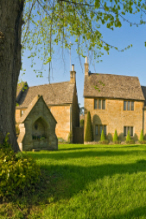Will the church frack?
The media took the Church's registration of its historic interests and linked it to fracking. Brie Stevens-Hoare QC and Alex Campbell go behind the headlines.
Fracking is such a hot topic that it feels like any media story has to have a fracking angle. Is that what has happened with the recent ‘Fracking and the Church of England’ stories?
The suggestion by the media seemed to be that, with an eye on the possible profits from fracking, the Church was taking legal action to obtain the right to the minerals under people’s homes. Is that an accurate account? Is the Church looking for profits? Is it taking legal action? If so, does it have anything to do with fracking? Or is the truth a mundane story of efficient property lawyers making sure the Church’s existing property rights are protected with others misunderstanding its significance.
What has the Church done?
As the Church of England website states, it has been involved in a programme of research into various historic rights vested in it. As a result, since 2008 it has made a large number of applications to Land Registry to register those rights by way of notice. Those applications result in the Land Registry sending notice of the Church’s applications to the registered owners of the land affected. It seems the owners of about 500,000 acres in England have received such notifications.
Why has the Church done this?
There is a fast approaching legal deadline for the protection of the rights these applications relate to. That deadline has been created by the Land Registration Act 2002. Unsurprisingly the number of applications has escalated as the deadline draws nearer.
13 October 2013 is the 10th anniversary of the implementation of the Land Registration Act 2002 (the LRA”). A handful of interests that have been protected as overriding interests since at least 1925 will be stripped of their overriding status on that anniversary (See s117 (1) of the LRA and paragraphs 10 to 14 of Schedules 1 and 2).
Those rights include manorial rights, franchises, rights to rent reserved to the Crown and rights to payment in lieu of a tithe. The Church’s rights to chancel repairs are similarly about to lose their overriding status. No one will be surprised by the Church acting to protect its rights to chancel repairs notwithstanding the implication for individual freeholders affected.
In practice, the arrival of 13 October 2013 will mean two things. First, the ability to register the affected right without charge will be lost (see s117(2) LRA). Second, and more important, the rights themselves may be lost or at risk. If the Church’s right affects a third party’s registered land, as long as it is not protected by a notice on the register, anyone acquiring an interest in the freehold after 13 October 2013 will take free of that right. If the land affected is unregistered and the right has not been protected by a caution against first registration in the event of first registration, the right will simply be lost.
The Church has the benefit of any manorial rights over huge areas of England. The most valuable manorial right is likely to be the right to mines and minerals. Any such rights the Church is able protect on the register now will have existed for centuries. Generally the individual freehold title affected will have been created subject to the right. When the old feudal copyhold titles were converted, by enfranchisement, to freeholds the title related to the surface of the land only. The copyhold landlord, often the Church, retained ownership of the mine and mineral interests under the surface.
And the fracking thing?
The suggestion that the Church’s recent applications are driven by a desire to profit from fracking is misconceived. Fracking, as currently being discussed, is a process by which oil and natural gas are extracted from the earth’s crust. Shale gas is the natural gas most commonly released.
Under the Petroleum Act 1998 all mineral oil natural gas, which includes shale gas, in Great Britain (including England) or the United Kingdom’s territorial seas belong to the Crown. In other words, the gas that fracking will release has been nationalised and vested in the Crown like coal, gold and silver before it. The Church’s manorial rights to mine and minerals will not entitle it to extract and take the benefit of shale gas whether released by fracking or otherwise.
Careful property lawyers
So the media has been seeing shadows that are not there. The Church’s action had nothing to do with fracking. However, it has been a timely reminder that the scope of overriding interests reduces further on 13 October 2013.
Brie Stevens-Hoare QC and Alex Campbell are barristers at Hardwicke Chambers.